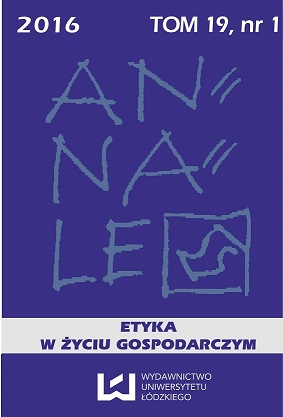Meandry konsumpcji we współczesnym społeczeństwie: konsumpcjonizm versus dekonsumpcja
DOI:
https://doi.org/10.18778/1899-2226.19.1.04Słowa kluczowe:
consumptionism, consumption, sustainable consumption, consumption styles, consumption societyAbstrakt
The characteristic discriminant of contemporary societies, particularly in economically developed countries, is, on the one hand, the expansion of consumerism in various spheres of economic and social life, while on the other hand, it is the attempt to restrict excessive consumption. The principal aim of this paper is the description of the chosen changes in consumption in contemporary society and their economic consequences. The author searches for answers to the following question: What orientations mark out the behaviour of consumers in the market? In the search for answers to this question, the orientation towards excessive consumption that is stimulated by the ideology of consumerism and deconsumption as a protest against consumerism have been placed under analysis. In analysing the ideology of consumerism, the main styles of consumerism have been indicated as follows: consumption of pleasures, compulsive consumption and symbolic consumption. In contrast to the behaviour associated with over-consumption, the behaviour in pursuit of the restriction of the consumption of goods indirectly connected with actual needs has been described, namely sustainable consumption and anti-consumption, as well as the voluntary simplicity movement in consumption.Bibliografia
Ballantine P.W., S. Creery, The Consumption and Disposition Behavior of Voluntary Simplifiers, „Journal of Consumer Behavior” 2009, vol. 8, nr 1, s. 45–56.
Google Scholar
DOI: https://doi.org/10.1002/cb.302
Bartholomew C., Christ and Consumerism: An Introduction [w:] Christ and Consumerism. Critical reflections on the spirit of our age, red. C. Bartholomew, T. Moritz, Paternoster Publishing, Carlisle 1988.
Google Scholar
Bauman Z., Życie na przemiał, Wyd. Literackie, Kraków 2005.
Google Scholar
Bauman, Konsumowanie życia, Wyd. Uniwersytetu Jagiellońskiego, Kraków 2009.
Google Scholar
Belk, R.W., G. Ger, Consumption in Affluent Societies [w:] Encyclopedia on Sustainable Development, red. E.F. Moran, UNESCO 2011, http://www.eolss.net/sample-chapters/c11/e1-11-07-03.pdf
Google Scholar
Black I.R., H. Cherrier, Anti-consumption as Part of Living a Sustainability Lifestyle: Daily Practices, Contextual Motivation and Subjective Values, „Journal of Consumer Behavior” 2010, vol. 9, nr 6, s. 467–487.
Google Scholar
DOI: https://doi.org/10.1002/cb.337
Bockock R., Consumption, Routledge, London 1993.
Google Scholar
Bourdieu P., Dystynkacja. Społeczna krytyka władzy sądzenia, Wydawnictwo Naukowe Scholar, Warszawa 2005.
Google Scholar
Bylok F., Konsumpcja, konsument i społeczeństwo konsumpcyjne we współczesnym społeczeństwie. Studium socjologiczne, Wyd. Naukowe „Śląsk”, Katowice 2013.
Google Scholar
Bylok F., Konsumpcja w Polsce i jej przemiany w okresie transformacji, Wyd. Politechniki Częstochowskiej, Częstochowa 2005.
Google Scholar
Bywalec Cz., L. Rudnicki, Konsumpcja, PWE, Warszawa 2002.
Google Scholar
Campbell C., The Romantic Ethic and the Spirit of Modern Consumerism Basil Blackwell Publisher, London 1987.
Google Scholar
Dąbrowska A., F. Bylok, M. Janoś-Kresło, D. Kiełczewski, I. Ozimek, Kompetencje konsumentów – innowacyjne zachowania, zrównoważona konsumpcja, Wyd. PWE, Warszawa 2015.
Google Scholar
Etzioni A., Voluntary Simlicity: Characterization, Select Psychological Implications and Societal Consequences, „Journal of Economic Psychology” 1998, vol. 19, nr 5, s. 619–643.
Google Scholar
Ger G., R.W. Belk, I’d Like to Buy the World a Coke: Consumptionscapes of the “Less Affluent World”, „Journal of Consumer Policy” 1996, vol. 19, s. 271–304.
Google Scholar
DOI: https://doi.org/10.1007/BF00411411
Harrison R, T. Newholm, D. Shaw, Pressure Groups, Campaigns and Consumers [w:] The Ethical Consumer, red. R. Harrison, T. Newholm, D. Shaw, Sage, London 2005.
Google Scholar
DOI: https://doi.org/10.4135/9781446211991
Haubl R., „Welcome to The Pleasure Dome” Einkaufen als Zeitvertrieb [w:] Freizeit in der Erlebnisgesellschaft. Amüsement zwischen Selbstverwiwklischung und Kommerz, red. H.A. Hartmann, R. Haubl, Auflag 1, Westdeucher Verlag, Wiesbaden 1996.
Google Scholar
DOI: https://doi.org/10.1007/978-3-322-87768-0_9
Hellman K-U., Das konsumistische Syndrom [w:] Räume des Konsums über den Funktionswandel von Räumlichkeit im Zeitalter des Konsumismus, red. K-U. Hellman, G. Zurstiege, VS Verlag für Sozialwissenschaften, Wiesbaden 2008.
Google Scholar
DOI: https://doi.org/10.1007/978-3-531-90779-6
Hörning K.H., Ansätze zu einer Konsumsoziologie, Verlag Rombach, Freiburg 1970.
Google Scholar
Leibenstein H., Bandwagon, Snob, and Veblen Effects in The Theory of Conspicuous Demand, „Quartely Journal of Economics” 1950, vol. 64, s. 183–207.
Google Scholar
DOI: https://doi.org/10.2307/1882692
Lewicka-Strzałecka A., Konsumeryzm kontra konsumeryzm, „Annales. Etyka w Życiu Gospodarczym” 2003, vol. 6, s. 132–138.
Google Scholar
Mc Cracken G., Culture and Consumption. New Approaches to the Symbolic Character of Consumer Goods and Activities, Indiana University Press, Bloomington/Indianapolis 1988.
Google Scholar
Miles S., Consumerism – as a Way of Life, Sage, London 1998.
Google Scholar
DOI: https://doi.org/10.4135/9781446217115
Ottman J.A., Green Marketing: Challenges and Opportunities for the New Marketing Age, NTC Business Books, Lincolnwood 2003.
Google Scholar
Papież Franciszek, Encyklika Laudato SI’ Ojca Świętego Franciszka poświęcona trosce o wspólny dom, 2015, https://w2.vatican.va/content/dam/francesco/pdf/encyclicals/documents/papa-francesco_20150524_enciclica-laudato-si_pl.pdf.
Google Scholar
Portwood-Stacer L., Anti-consumption as tactical resistance: Anarchists, subculture, and activist strategy, „Journal of Consumer Culture” 2012, vol. 12, nr 1, s. 87–105.
Google Scholar
DOI: https://doi.org/10.1177/1469540512442029
Prisching M., Die zweidimensionale Gesellschaft. Ein Essay zur neokonsumistischen Geisteshaltung, VS Verlag für Sozialwisenschaft, Wiesbaden 2009.
Google Scholar
DOI: https://doi.org/10.1007/978-3-531-91992-8
Schulze G., Die Erlebnisgesellschaft. Kultursoziologie der Gegenwart, Verlag Campus, Frankfurt/M 1992.
Google Scholar
Sklair L. Iconic Architecture and the Culture-ideology of Consumerism, „Theory, Culture & Society” 2010, vol. 27, nr 5, s. 135–159.
Google Scholar
DOI: https://doi.org/10.1177/0263276410374634
Sklair, L., Sociology of the Global System, Johns Hopkins University Press, Baltimore 1991.
Google Scholar
Stihler A., Die Entstehung des modernen Konsums. Darstellung und Erklärungsansätze, Verlag Duncker und Humbold, Berlin 1998.
Google Scholar
DOI: https://doi.org/10.3790/978-3-428-49072-1
Szulc E., Dekonsumpcja – moda czy kryzys, seria „Nierówności społeczne a wzrost gospodarczy”, nr 24, Uniwersytet Rzeszowski, Rzeszów 2012.
Google Scholar
Ullrich W., Habenwollen. Wie funktioniert die Konsumkultur?, S. Fischer Verlag, Frankfurt am Main 2006.
Google Scholar
Veblen Th., Teoria klasy próżniaczej, PWN, Warszawa 1971.
Google Scholar
Wątroba W., Homo postmillenius, Wyd. Uniwesytetu Ekonomicznego we Wrocławiu, Wrocław 2008.
Google Scholar
Wiswede G., Konsumsoziologie - Eine vergessene Disziplin [w:] Konsum: soziologische, ökonomische und psychologische Perspektiven, red. D. Rosenkranz, Verlag Leske+Budrich, Opladen 2000.
Google Scholar
DOI: https://doi.org/10.1007/978-3-322-89612-4_2
Pobrania
Opublikowane
Jak cytować
Numer
Dział
Licencja

Utwór dostępny jest na licencji Creative Commons Uznanie autorstwa – Użycie niekomercyjne – Bez utworów zależnych 4.0 Międzynarodowe.









